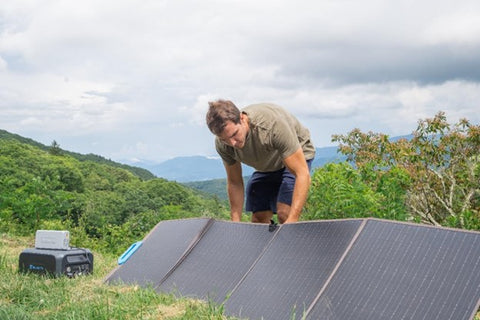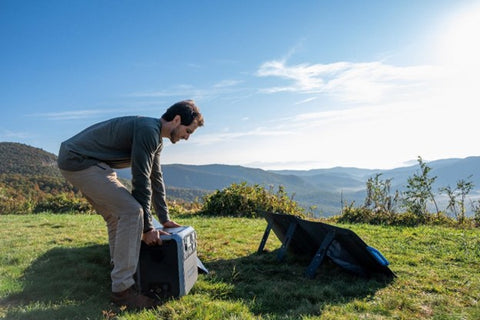It is important that in the event of a fire, people have access to a stable power source that will allow them to continue using essential appliances like phones and computers. Fortunately, portable solar panels can come in very handy as a makeshift power solution in times of need.
We will examine what portable solar panels are, why they make sense in areas ravaged by fire, and what precautions must be taken to ensure their safety.
What Are Portable Solar Panels?
Portable solar panels are solar panels that are compact and lightweight enough to be easily moved and set up in different areas. These solar panels harness the sun's rays to produce electricity, which can then be utilized to run various loads, such as lighting, electronics, and home appliances. The solar energy captured by portable solar panels is converted into electricity by special photovoltaic cells. The power can either be stored in a battery or used immediately to charge electronics.
Benefits of Using Portable Solar Panels in the Event of a Fire
Having portable solar panels available is a huge help in areas damaged by fire. To name just a few of the benefits, we have:
Reliability
Assuming the electrical system has been damaged or is down, portable solar panels provide a reliable power source in a fire emergency. Portable solar panels use the sun's natural energy to generate electricity, as opposed to traditional power sources that rely on fossil fuels. That means they can keep producing energy even if there is a blackout or some other problem with the electrical grid. This can be of great use in a fire emergency if electricity is needed to run life-saving machinery or communications systems.
Safety
Since they do not release harmful pollutants, portable solar panels are a very safe choice to consider for use in times of emergency. Carbon dioxide and other greenhouse gases contribute to pollution and climate change, but portable solar panels don't have that effect. And because there is no risk of fire or explosion with portable solar panels, they can be used in any situation where electricity is needed.
Flexibility
Portable solar panels can be taken anywhere and set up quickly, making them incredibly flexible. This makes them a valuable resource to have on hand in a fire emergency, especially if the fire's position is uncertain and may move about. As an added bonus, portable solar panels can be utilized to power various devices, including lights, communications systems, and medical equipment, making them meet their objective in any emergency.
Durability
Portable solar panels are built to endure severe weather and heavy handling, making them a reliable choice for use in fire emergencies. Because of their durability and resistance to the elements, they can keep functioning in the face of severe weather and natural disasters, keeping vital systems and machinery running.
Cost-Effectiveness
Portable solar panels are a low-cost way to produce electricity in times of crisis. They are also cost-effective in the long run because of the lack of fuel and maintenance expenses and the potential reduction in electrical expenditures. Portable solar panels can be purchased reasonably, making them a practical choice for those who want a secondary power source in case of an outage.
How to Choose and Set Up Portable Solar Panels for Fire Emergencies

Step 1: Figure Out How Much Energy You Need
Power needs should be established before deploying portable solar panels in the event of a fire. To meet these prerequisites, you must consider the many electrical gadgets you intend to use, as well as the total energy they will consume. Some electronic devices, like smartphones, only demand a few watts of electricity, while others, like laptops and satellite phones, need far more. If you want to know how many and what size portable solar panels to buy, you need to know how much power you will be using.
Step 2: Select Optimal Solar Panels for Your Needs
There are different types of portable solar panels available on the market, each with its own set of features and benefits. So you must choose the right portable solar panels for your specific needs and environment. There are a few things to keep in mind when shopping for portable solar panels that include:
Panel Size: The size of the panel will determine how much power it can generate. Larger panels can generate more power, but they may also be more difficult to transport.
Efficiency: The efficiency of a solar panel refers to how well it can convert sunlight into electricity. Higher-efficiency panels will be able to generate more power in a given amount of time.
Weight and Portability: If you are carrying the portable solar panels with you, make sure to consider their weight and portability. Look for brands offering portable solar panels that are comparatively more lightweight and easy to pack.
Step 3: Start Setting Up the Portable Solar Panels
At last, place the solar panels in the following way:
Choose a Suitable Location for Placing the Solar Panels
The ground must be flat and free of obstacles like trees and buildings. The location needs to be exposed to lots of sunlight during the day.
Assemble the Solar Array's Supporting Structures
It may be necessary to use stands or mounts to secure your solar panels in place. Install the stands or mounts in keeping with the manufacturer's instructions.
Unfold and Lay Out the Solar Panels
Place them so that they will get the maximum sunshine, and make sure they are evenly spaced.
Connect the Solar Panels to the Charge Controller
Most portable solar panels come with a charge controller, which regulates the flow of electricity from the panels to the batteries. Connect the solar panels to the charge controller using the appropriate cables.
Connect the Charge Controller to the Batteries
The charge controller should have a set of outputs for connecting to the batteries. Connect the controller to the batteries using the appropriate cables.
Set Up the Inverter
Use an inverter to power any appliances that require AC power, such as a laptop or phone charger. To use your electronic equipment, you need an inverter, which changes the DC power from your batteries into an AC. Use the correct cables to link the inverter to the batteries.
Test the System

Once everything is plugged in, power up the inverter and check to see if your devices are getting power. If everything is working properly, you are ready to start using portable solar panels to power your essential equipment and devices.
Monitor and Maintain the System
It is important to regularly check and maintain the portable solar panel system to ensure it is working properly. This includes checking the charge controller and inverter for any issues, as well as keeping the solar panels clean and free from debris.
Disconnect and Dismantle the System When No Longer Needed
When the fire has been extinguished, and power has been restored, it is important to disconnect and dismantle the portable solar panel system. This entails folding and stowing the solar panels and unplugging the batteries and inverter from the charge controller.
By following these steps, you can set up portable solar panels during a fire and power essential equipment and devices.
Fire Emergencies: Keep Devices and Equipment Running with Portable Solar Panels
Portable solar panels are a useful power source in emergencies, particularly when there is a fire and access to the grid is limited or impossible. Here are some of the devices and equipment that portable solar panels can power in case of fire:
Emergency Lighting
One of the most important devices that portable solar panels can power in case of a fire emergency is emergency lighting. This type of lighting is critical in providing illumination in areas where the power has been cut off due to the fire or in situations where the visibility is low due to smoke or other debris.
Portable solar panels can be used to charge the batteries of emergency lighting, ensuring that they are always ready to be activated in case of an emergency. This is especially important for large buildings or facilities with a significant amount of emergency lighting that needs to be powered.
Communications Equipment
Another device that portable solar panels can power during a fire emergency is communications equipment. During a fire, it is crucial that firefighters communicate with each other and the command center to coordinate their efforts and ensure the safety of everyone involved.
Unfortunately, fires can often damage power lines and other infrastructure, making it difficult for traditional communication methods to function properly. Portable solar panels can provide a reliable power source for radios, phones, and other communication devices, allowing firefighters to stay connected and coordinate their efforts effectively.
Medical Devices
Medical devices, such as oxygen concentrators and nebulizers, can be powered by portable solar panels in case of a fire emergency. These devices are essential for maintaining the health and well-being of people who may have been affected by smoke or other toxins. Medical devices can be used to provide life-saving treatment to those who are injured or suffering from respiratory issues. They can also be used to monitor vital signs and provide other medical care in a variety of settings.
Portable Fans
Portable fans are a common household item that can be powered by portable solar panels in case of a fire event. When power lines are down, or electricity is unavailable, portable solar panels can provide power to keep these fans running. This is particularly true and useful for circulating air in a room or tent, helping to keep individuals cool and comfortable during a disaster. Portable fans can also be used to help dissipate smoke and other contaminants, making them an important tool for fire safety.
Takeaways
If you live in a region where wildfires are common, our solar panels just might be a godsend. Remember, prevention is better than cure, so taking precautions beforehand is the best way to get out of harm's way. Consider installing solar panels on your property as a security measure.




